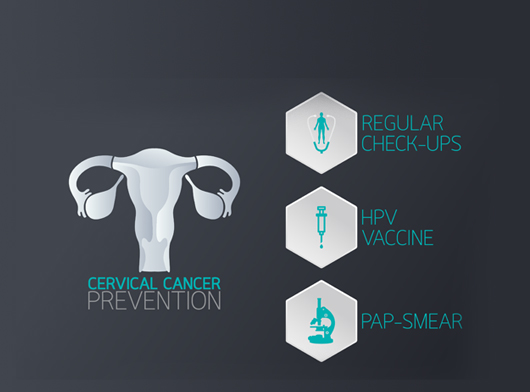
Prevention
Prevention is better than Cure - Say NO to Cervical Cancer
This post is going to address one of the leading forms of cancer among women in India - Cervical cancer. This cancer affects the cervix – which is the lower part of the womb. Cervical cancer is the second most common cancer in India in women accounting for 22.86% of all cancer cases in women and 12% of all cancer cases in both men and women. One woman dies of cervical cancer every 8 minutes in India, and close to 70% of women who have cervical cancer in India will die for various reasons. One of them is the lack of health infrastructure to treat this disease. So many Indian women have cervical cancer, yet there is not enough infrastructure to treat it. This means that because of the “long queue”, if a woman is diagnosed with cervical cancer in this country, she will likely die before getting diagnosed or post-diagnosis, the required treatment. Other reasons include the cost of treatment and lack of awareness about the disease.
What makes this situation really tragic is that although cervical cancer is so deadly, it is perfectly preventable. It is not like ovarian cancer, where an exact cause is not yet known. It is not like breast cancer, where even after adopting healthy lifestyle changes, there is still that chance that you might develop it.
No! It can be completely, 100% prevented.
Cervical cancer is caused by a virus called Human Papillomavirus (HPV). This virus is transmitted sexually. HPV is so infectious that actual sexual intercourse does not have to occur for it to be transmitted. It can be transmitted from one infected genital to another, directly or indirectly. HPV is also the most common sexually transmitted virus in the world because nearly all sexually active people have been infected with HPV
What are the risk factors?
HIV: An infection of the Human Immunodeficiency Virus (HIV) increases the susceptibility to developing cervical cancer.
Other risk factors are
- Age: Cervical cancer affects mostly the middle-aged and is seen rarely in women below 15 years
- Cigarette Smoking
- Promiscuity: Having multiple sex partners or having a partner who is promiscuous
- History of Sexually Transmitted Diseases
- Having had multiple full-term pregnancies
- Long-term use of Oral Contraceptives
HPV has several strains. Some strains cause genital warts but do not cause cervical cancer. Other strains cause infections that get cleared up by the body even without treatment. This means that many are not even aware that they are infected. However, there are some HPV strains which are particularly dangerous because they persist. These are the strains that can infect the cells in the cervix, which can lead to the development of pre-cancer. After festering for 7 to 20 years, this progresses to cancer. For those with any of the risk factors, it may progress even faster.
How to prevent this?
This is why cervical cancer screening is so important and beneficial. Since it takes so long for cancer to actually occur, with early screening, these pre-cancer cells can be easily detected and treated. The PAP smear looks for pre-cancers and cell changes on the cervix that might become cervical cancer if they are not treated appropriately.
When to start?
The recommended age to start going for screening in India is 30 years. Start going for cervical cancer screening about 10 years after your first sexual contact, and keep going every 3 – 5 years. If pre-cancer is detected, it can be treated before it becomes full-blown cervical cancer.
An important form of prevention is the HPV vaccination. If you have never been sexually active, you can get immunized. This helps prevent infection with the various strains of HPV. For those who are sexually active, use a condom, be faithful, do not have multiple sexual partners etc., you know the drill. But just so you know, condoms are not fully effective because there can still be skin-to-skin contact when using a condom.
Now you know the three ways to prevent this deadly disease. Tell your mother, sisters, aunts and friends. You just may save a life.
Prevention is Better than Cure…Say No to Cervical Cancer!!
